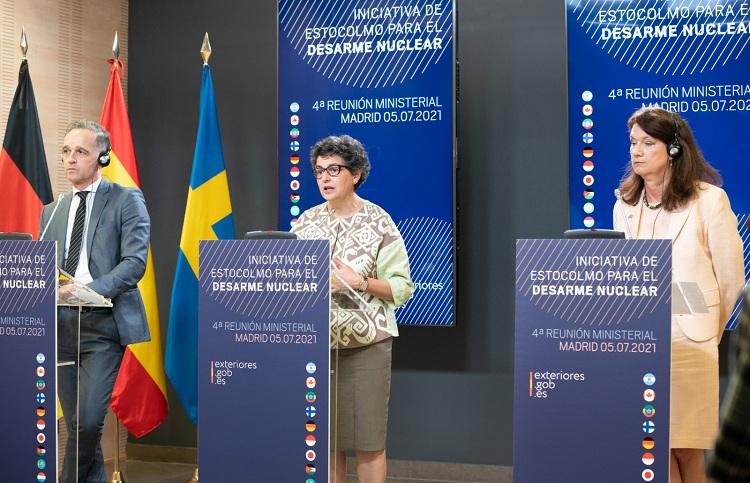Eduardo González
The fourth Ministerial Meeting of the Stockholm Initiative for Nuclear Disarmament, held yesterday in Madrid, expressed its satisfaction with the extension of the New START and the forthcoming resumption of the dialogue on strategic stability between the United States and Russia. Spanish Foreign Minister Arancha Gonzalez Laya went even further and expressed her wish that China would join Russian and U.S. nuclear arms control efforts.
The Palacio de Viana in Madrid hosted yesterday the fourth Ministerial Meeting of the Stockholm Initiative for Nuclear Disarmament, convened by the Foreign Ministers of Spain, Germany and Sweden, Arancha González Laya, Ann Linde and Heiko Maas, respectively, and which brought together sixteen countries of diverse geographical origin: Germany, Argentina, Canada, South Korea, Spain, Finland, Indonesia, Japan, Jordan, Kazakhstan, Norway, New Zealand, the Netherlands, Sweden and Switzerland.
The Stockholm Initiative, established in 2019, aims to strengthen the Non-Proliferation Treaty (NPT), promote nuclear disarmament and achieve a nuclear-weapon-free world. Last year, the Initiative presented 22 concrete proposals (Stepping Stones) in Berlin to revitalize and advance nuclear disarmament efforts, and during yesterday’s meeting the ministers discussed the current state of the nuclear disarmament and non-proliferation regime and reviewed priorities for strengthening the NPT and advancing its goals and objectives, including further reductions in nuclear arsenals.
At the conclusion of the meeting, the ministers agreed to a joint statement in which they renewed “their call on all nuclear-weapon states to show leadership, address and reduce nuclear risks and promote nuclear disarmament by taking meaningful steps to fulfill their commitments under the NPT”. They also expressed satisfaction with the February extension of New START and “the planned resumption of the U.S.-Russia strategic stability dialogue“, and welcomed “the reaffirmation by both presidents (Joe Biden and Vladimir Putin) that a nuclear war cannot be won and should never be fought”.
Apart from that, the Stockholm Initiative ministers also focused on their contributions to the next NPT Review Conference, which “was scheduled for September this year and has been postponed to early next year”, according to González Laya, and expressed their satisfaction with the adoption of a new Stockholm Initiative working paper on nuclear risk reduction, promoted by Switzerland. However, “we have to go beyond the simple reduction of nuclear risk,” warned González Laya during the press conference following the meeting, in which Maas and Linde also participated. “For this reason, we want to thank and, above all, put the emphasis on the start of negotiations between the United States and Russia for an arms control that goes beyond the New START treaty and that seeks to add, if possible, China to these efforts”, he added.
The participants also showed their support for the Comprehensive Nuclear-Test-Ban Treaty (CTBT) and explored, according to the Spanish minister, “how to promote its entry into force and, in the meantime, how to adopt at least a moratorium in terms of nuclear testing”. The ministers also discussed the start of negotiations on the Fissile Material Cut-Off Treaty (FMCT), the establishment of a Zone Free of Nuclear Weapons and other Weapons of Mass Destruction in the Middle East, the entry into force of the Treaty for the Prohibition of Nuclear Weapons and the prospects for preserving and strengthening the Joint Comprehensive Plan of Action on Iran (JCPOA), “knowing as we do that the only way to deal with this issue is through negotiation between the parties that will contribute to greater stability in the Middle East and greater security for all of us,” added González Laya.
Joint letter
Prior to the ministerial meeting, Arancha González Laya, Heiko Maas and Ann Linde published a joint letter in which they denounced that “nuclear disarmament and non-proliferation agreements have been progressively eroded in recent years” due to “new tensions and mistrust between global powers”, which “have accelerated the expansion of atomic arsenals”, but they also highlighted some advances, such as the New START agreement and the rapprochement between Biden and Putin. “We expressly applaud all these positive developments, but call on all nuclear powers to take new and decisive steps towards disarmament” and to “lay the foundation for a new generation of arms control agreements,” they added. They also urged to “put an end once and for all” to nuclear testing and to improve “nuclear disarmament verification capabilities”.
On the occasion of the ministerial meeting, Gonzalez Laya had an intense day yesterday that began with a working breakfast with the administrator of the United Nations Development Program (UNDP), Achim Steiner, and continued with bilateral meetings with Heiko Maas, Ann Linde and his counterpart from Jordan, Ayman Safadi.







